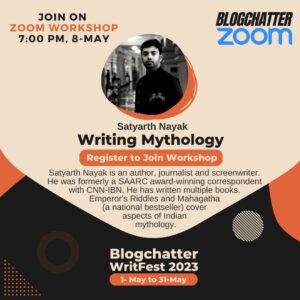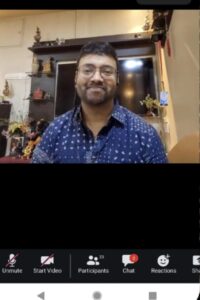Writing Mythology
Mythology is a genre that choose me.
When it comes to reading, romance was my only favorite genre! Than I read a book called The Raavan Key, which I received as a review copy, and then I knew there was a new genre in my favorites!
A few days back, I saw Blogchatter has a workshop on Writing Mythology and knew I would enjoy learning new aspects of writing mythology. And it was the most informative writing workshop ever.

In this session, Satyarth Nayak, the author of the book Mahagatha which is a national bestseller. It is a collection of the 100 greatest mythological tales handpicked and compiled into an epic. The author talked about the need for mythology, tips to write characters, modernizing a story, and much more!
Mythology has been with us for years, but how much do we know?
How to narrate mythological stories?
Is there any X factor we need to find while writing mythological fiction?
How to make sure that new young readers, while reading mythology, do not get confused between real and fictional?
Many intriguing questions asked brought a new perspective for me while reading mythology.
Here are the takeaways from the session –

Research is vital – There should be a sense of narrative, and the story should be interlinked. On a subconscious level, that story chooses you. The idea emerges from the background of your beliefs and upbringing.
Perspective –
The mythology we have read has much more stories to tell. There are multiple ideologies and perspectives to narrating a story, like queer perspective connecting to King Sadyumna. The author also talked about the woman perspective and how mythology has been celebrating women, where he gave the example of Swaha and her importance in every Yagna.
Kali, Shakti, and many other women have been a warrior, and mythology talks about it.
Characters and conversations –
While writing the dialogue, the author should justify it. If the character hates the other character, although not your thinking, you should be ab to give justice to the morality and the perspective of every character.
Satyarth explained this by recalling Javed Akhtar talking about how he had to think from Gabbars’ point of view. While writing dialogues, his opinions don’t matter. He should be able to justify the character.
The writer might have a different perspective, but having a clear message you want to portray is essential.
Writing liberties –
When writing mythology, realize it is a new universe. The works of authors are just a renewed perspective.
Mythology is already interesting. The way ancient writers have written their imagination across Yuga is already thrilling.
If you can think about a new angle to the story, there is a possibility for a renewed aspect. So there are colors to every perspective. There are many layers to understanding the complexity of the mythological stories. An author passes the wisdom by creating a contemporary setup, remembering to respect our earlier mythology stories, and presenting them to readers.
X factor – write what excites you. There is no sure-shot way to write a popular book. It is the readers who find the X factor. The kind of language, aura, and how you present make it intriguing. Just write from your heart, and it will be an honest book.
Blog written as a part of BlogchatterWritFest
